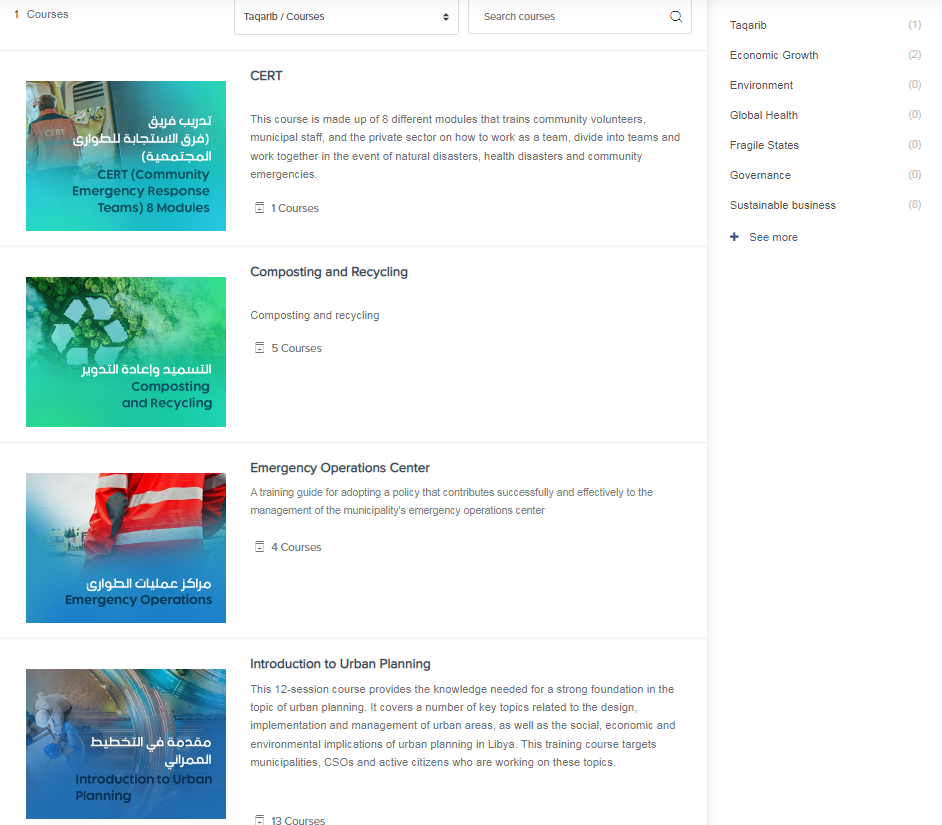Let us know what type of content you'd like to see more of. Fill out our three question survey.
Emerging eLearning Series: Accessible Training at Scale to Increase Local Governance Capacity in Libya
This post is one of a series of posts on Emerging eLearning.
Aug 24, 2022
Since the beginning of the COVID-19 pandemic, DAI’s Center for Digital Acceleration (CDA) has been at the forefront of supporting international development projects to understand, apply, and implement eLearning solutions in settings that had not initially considered their wide-scale use.
This is the second in a series of posts that seek to capture some of these efforts, celebrate innovative successes, consider critical lessons learned, and support practitioners who continue to do this work.
Training Local Government Officials in Libya
Among the first acts of Libya’s revolutionary government in November 2011 was to create a Ministry of Local Government, a first step in actionable decentralization, a core value of the revolution, seen as insurance against the emergence of another dictatorship. The U.S. Agency for International Development (USAID)-funded Libya Local Governance and Civil Society Program, locally known as “Taqarib” (Arabic for coming together or growing closer), strengthens the foundation of a more unified Libya by empowering local governments, reinforcing community bonds, and improving people’s standard of living. Taqarib helps citizens engage in public dialogue, prioritize public resource allocations, and understand the roles and responsibilities of local government. As part of this effort, Taqarib offers numerous outreach and training opportunities for local government officials.

Taqarib eLearning courses on learning.dai.com.
Before the pandemic, Taqarib had already engaged with Libyan municipalities and given in-person training on more than 60 topics to these officials. The challenge the pandemic now posed to the CDA and Taqarib teams was twofold:
- How could content previously delivered via in-person workshops effectively be adapted to an online environment?
- In which ways could this content be broadly accessible to civil servants in a diverse array of Libyan contexts?
Two years into project development, we would like to share some key lessons learned, considering one central question: How can a digital training mechanism best be implemented in a context where both technical and technological capacity are being developed simultaneously?
Considerations for eTraining of Local Government Officials
We consider the following points as key elements of our success in creating a remote learning environment to support the Taqarib eLearning experience, using DAI’s external-facing learning management system, learning.dai.com, as the means to disseminate material.
- Consider the technological capacity of your learners. In determining the correct eLearning tool or tools to use that fit your project’s needs, it is fundamental to clearly understand the technological capacity of your end-users—your “learners.” Since they are the ones who will be navigating the platform themselves in self-paced course environments like the ones Taqarib developed, you should ask yourself questions like: Can learners access the course environments easily? Are the buttons and navigation clear? Are steps to enter the learning content self-explanatory? If anything seems unclear to you, it probably will be unclear to your learners as well.
- Ensure your content is fully realized. Confirm that all content is final before developing it in a learning environment. Changes in course structure that might seem small or easy to change in in-person contexts often require significant rework to be effective in online learning environments, such as a learning management system. While it may take more planning work than initially anticipated, it saves more time-intensive changes further down the line to fully develop your content and scaffolding for your learning environment before building out the learning environment itself.
- Pilot and incorporate feedback for best results. We can make our best-educated guesses around whether the user experience is clear, but there is no substitute for piloting with real users before launching. In Taqarib’s case, it was fundamental to have a pilot run with learners from one municipality before launching on a national scale. This provides opportunities for all types of feedback to incorporate before the project is finalized to ensure that the learning environment fits with what users ultimately need and what they are able to access. In these piloting processes, it is important to take all user feedback seriously, as seemingly small changes can engender huge differences in future learner engagement.
Thinking Nationally, Acting Locally
The Taqarib eLearning platform is currently being piloted with one municipality, with plans to make adjustments based on feedback from those municipal civil servants and then roll out the content nationally as appropriate. This level of scale is difficult to reach solely with in-person training, which would require a complex and comprehensive infrastructure of trainers at the national level. We are excited to see this virtual learning environment come to life in a way that will actively support improvements to Libyan governance, in a broad and scalable way, improving the daily lives of constituents.